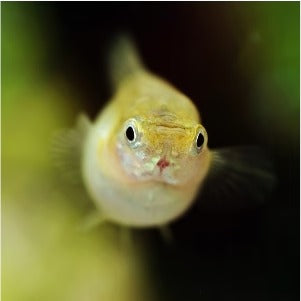
An experience that changed aquaristics
F. MattierShare
We are in 2004.
So 20 years ago.
Social networks are just emerging, and at that time, fishkeeping forums are very "tech-savvy". A beginner who asks if they can buy a guppy is asked for the pH of their water, the hardness, the nitrates and nitrites, the volume of their aquarium, the substrate composition, the reference of their light tubes, and especially the sacred brand and power of their filter!
A fool (your servant), who thinks that his fish are bored in the aquarium, then decides, in the spring, to offer a female guppy a natural summer vacation. He transfers her to the garden, into a simple 80-liter trash can full of mosquito larvae and daphnia.

"Over the course of the summer, the water turns green until it becomes opaque. The bin being oriented to the north, I rarely add water and the whole thing is a bit 'neglected'."
At the end of October, convinced that the guppette has disappeared since I haven't seen it for months, I dip a net into this water at 12°C and… I catch a fish that has doubled in size, incredibly lively and colorful.
"She then gives me, all winter long, batches of 100 fry in the aquarium!"
It was almost impossible at the time to publicly share this experience, as the dogmas were so strong and it called into question everything we thought we knew.
But the "poubellarium" was born!

This experience later inspired hundreds of others, which challenged the dogma of filtration, relativized the sensitivity of fish to various parameters, largely compensated by well-being and the absence of stress, etc.
In short, the "clinical" and very technological approach of the aquarium was turned upside down.
"Then discoveries about the microbiota revealed that the stability of an aquarium depended on its microbial diversity and not on its 'cleanliness'."
"It is therefore a return to nature outdoors, made by chance 20 years ago, that allowed me to reconsider aquarium practices in a different light."
With these unprecedented practices, a procession of creatures once ignored, even feared, has also entered the aquarium: the daphnia, the water lice, the ostracods, the Blackworm, the springtails, the bladder snails, etc.
An exercise in letting go that allows for less intervention, to let balances occur without hindrance.
The magnifying glass has taken its place next to the aquarium where the chemical test kit once reigned!
The French aquatic garden has become a natural pond, less decorative but so much more fascinating...
Neither filter, nor heating, sometimes even no fish...
But a small aquatic world finally accessible to everyone, where something is constantly happening and which teaches us something new every day.
And not just to children!
And there, Aquazolla was born!

9 comments
Cher Mattier,
Merci d’avoir ouvert les chemins, et de nous y avoir indiqué quelques pistes élémentaires.
Pour ma part, je continue de pleurer le sort de “glurpies” et bettas extraits de leurs belles demeures et rizières pour amuser les galeries de gens qui ne savent presque plus ce qu’est être vivant — ni, humain, plus préoccupant.
Merci donc de tenir vaillamment le cap, et de l’avoir posé comme Nord.
Je déblatère mais, hors de l’eau, qu’y a-t-il d’autre à dire ?
Merci, du fond du coeur.
Eleonore
J’ai abordé l’aquariophilie de manière très technique il y a 6/8ans, ferti, sol tech, co2, routine de maintenance.
Aujourd’hui, mes bacs sont pas des plus “aquascapés” du monde, mais ils restent sans doute assez appréciables & surtout je m’approche du plus possible du lowtech.
Pour cela, je réquisitionne l’aide de supers auxiliaires (que j’ai pris ici pour certains) ostracodes, aselles etc qui nous aident quotidienne au maintient du bac.
Pas de renouvellement (hormis évaporation à l’eau osmosée), les seuls test que je m’inflige c’est l’évolution du GH & phosphates, les nitrates étant toujours en déficit dans un aquarium décemment planté. Si besoin, je reminéralise une fois tous les 6 mois, je fais un petit renouvellement en cas de phosphates trop hauts.
Les bacs sont juste convenablement brassés & filtrés pour m’éviter une corvée de nettoyage du sol.
Si vous souhaitez faire une aquariophilie peu contraignante, renseignez vous du côté du lowtech – notech – walstad etc.
Chauffage, pompe, changement d’eau… trop de contraintes et trop peu écologique, j’avais finalement abandonné mon rêve d’enfant d’avoir un aquarium. Jusqu’à ce que je découvre le low tech. Après plusieurs mois de lecture, je me suis lancé l’année dernière et j’ai maintenant un aquarium qui allie mes rêves d’enfant avec mes aspirations d’adulte. Je comprends que vous y avez contribué, alors merci !
Je n’ai qu’un mot à dire: Bravo!
Ceci me rappelle un petit livre que je dévorais lorsque j’étais encore lycéen: “L’aquarium sauvage” .
La création d’un groupe d’amateurs de bassins naturels serait-elle une bonne idée?
Bien cordialement.